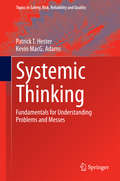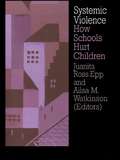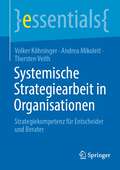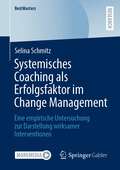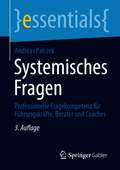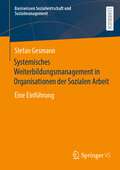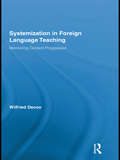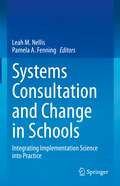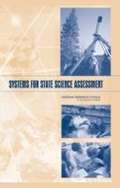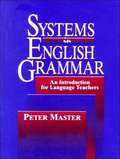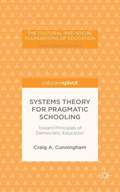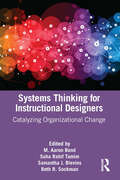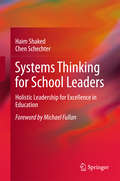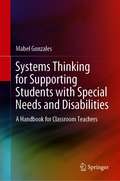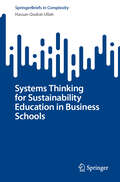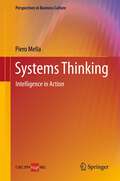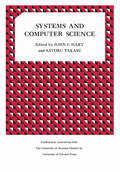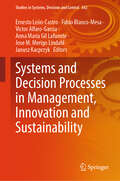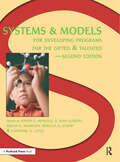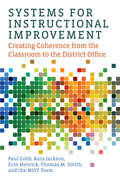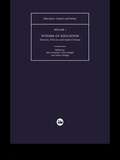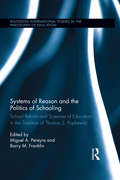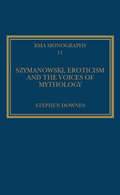- Table View
- List View
Systemic Thinking
by Kevin Macg. Adams Patrick T. HesterWhether you're an academic or a practitioner, a sociologist, a manager, or an engineer, one can benefit from learning to think systemically Problems (and messes) are everywhere and they're getting more complicated every day How we think about these problems determines whether or not we'll be successful in understanding and addressing them This book presents a novel way to think about problems (and messes) necessary to attack these always-present concerns The approach draws from disciplines as diverse as mathematics, biology and psychology to provide a holistic method for dealing with problems that can be applied to any discipline. This book develops the systemic thinking paradigm, and introduces practical guidelines for the deployment of a systemic thinking approach.
Systemic Violence: How Schools Hurt Children
by Juanita Ross Epp Alisa M. WatkinsonThis text examines the negative practices of schools which are resulting in school systems failing students. Such practices include intrusive authoritarian administrative structures and procedures; inappropriate discipline; unrealistic expectations; and placid exceptance of exclusionary practices. Indeed, educational systemic violence includes any practice or procedure that prevents students from learning, thus harming them. Taking a close look at ways in which current social problems may be a result of, or even supported by, compulsory schooling, the contributors to this volume consider whether or not schools contribute to the violence amongst modern young people.
Systemische Strategiearbeit in Organisationen: Strategiekompetenz für Entscheider und Berater (essentials)
by Volker Köhninger Andrea Mikoleit Thorsten VeithMegatrends und Disruptionen verändern die Organisationswelt radikal und erfordern neue Formen der Unternehmenssteuerung. Neben Strategiekompetenz werden die Verantwortungs- und Entscheidungskultur sowie die Lernfähigkeit von und in Organisationen essentielle Faktoren für zukünftigen Erfolg sein. Systemische Strategiearbeit liefert hierfür Anregungen und Konzepte – zur Gestaltung einer modernen Zukunftsarbeit.
Systemisches Coaching als Erfolgsfaktor im Change Management: Eine empirische Untersuchung zur Darstellung wirksamer Interventionen (BestMasters)
by Selina SchmitzUnternehmen stehen teilweise vor großen Umbrüchen und Veränderungen, die nachhaltiges Management erfordern. Gewünscht ist eine reibungslose Anpassung an organisationale Veränderungen, während Mitarbeitende Wünsche und Sehnsüchte nach Ruhe, Stabilität und verlässlichen Strukturen hegen. Diese Ambivalenz, an welcher ein Großteil von Veränderungsvorhaben scheitert, wird intensiv beleuchtet. Dieses Buch bietet dahingehend eingangs eine Metaanalyse zu den Ursachen von Herausforderungen in organisationalen Veränderungsprozessen, welche zu Widerständen der vom Wandel betroffenen Mitarbeitenden führen. Es wird anschließend untersucht, inwieweit Interventionen aus dem Systemischen Coaching diese Herausforderungen für gelingende Veränderungsprozesse wirksam bearbeiten können und daraus ein begleitender Coaching-Prozess für klassisches Change-Management entworfen. Final werden praktische Implikationen für Manager, Berater und Coaches vorgestellt.
Systemisches Fragen: Professionelle Fragekompetenz für Führungskräfte, Berater und Coaches (essentials)
by Andreas PatrzekDas essential stellt praxisnah dar, wie durch Fragekompetenz erfolgreiches Führen, Beraten und Coachen gelingt. Es bringt die wesentlichen Definitionen und Techniken auf den Punkt, vermittelt die theoretischen Grundlagen und Strategien und zeigt die Umsetzung. Orientiert an zentralen Merkmalen des systemischen Ansatzes wird die Kunst der Fragekompetenz verständlich dargestellt. Mit zahlreichen konkreten Beispielen und Formulierungshilfen für die tägliche Praxis.
Systemisches Management in sozialwirtschaftlichen Organisationen: Eine Einführung (Basiswissen Sozialwirtschaft und Sozialmanagement)
by Claudia RahnfeldDas Lehrbuch liefert Basiswissen zur systemtheoretischen Organisationstheorie in direktem Bezug auf Managementaufgaben in sozialen Einrichtungen. Grundlegende organisationstheoretische Erkenntnisse werden praxisnah und schrittweise erläutert. Die Autorin zeigt, wie Führen, Lernen und Vernetzung in sozialen Einrichtungen und die damit verbundenen Kommunikationsprozesse systemtheoretischer Logik folgen können.
Systemisches Weiterbildungsmanagement in Organisationen der Sozialen Arbeit: Eine Einführung (Basiswissen Sozialwirtschaft und Sozialmanagement)
by Stefan GesmannDas Lehrbuch widmet sich der Steuerung der betrieblichen Weiterbildung in Organisationen der Sozialen Arbeit/der Sozialwirtschaft. Basierend auf den Annahmen der Systemtheorie wird ein dezidiertes Verständnis von Weiterbildungsmanagement vorgestellt, das im Vergleich zu traditionellen Ansätzen des Weiterbildungsmanagements nicht nur einer erweiterten Zielsetzung folgt, sondern zudem den systemimmanenten Paradoxien und Spannungsfeldern rund um das Management von Fort- und Weiterbildungen Beachtung schenkt. Warum ein systemisches Weiterbildungsmanagement in erster Linie als Transfermanagement betrachtet werden muss und wie dieses konkret umgesetzt werden kann, wird theoriebasiert und praxisnah aufgezeigt.
Systemization in Foreign Language Teaching: Monitoring Content Progression (Routledge Research in Education)
by Wilfried DecooForeign language learning is a progressive endeavor. Whatever the method, the learner should advance from one point to another, constantly improving. Growing proficiency entails growing language content. Content is complex, displaying many dimensions. Syllabus designers, textbook authors, and teachers often struggle with the monitoring of content. Computer-assisted systemization helps to handle it in a manageable framework. Besides inventorying content, it ensures more balanced selections, calculated progression, and controlled reiteration of previously learned material. It gauges the usability of authentic material in relation to the level attained. During the teaching process, it allows the instant selection of items needed for a communicative situation, focus on forms, or particular exercises. This book first describes the theoretical background for systemization, including a historical overview, with special attention to the Common European Framework and the new Profiles and Referentials. Next the practical steps for computer-assisted implementation with examples taken from French and English, but applicable to any language.
Systems Consultation and Change in Schools: Integrating Implementation Science into Practice
by Leah M. Nellis Pamela A. FenningThis book explores the ways in which systems (organizational) consultation may be applied to school roles and functions as part of an overall systems change process. Using an implementation science framework grounded in systems/organizational consultation research, the volume details how school reform or improvement may be facilitated. School-based case studies illustrate the application of implementation science to systems change efforts in schools and districts across the United States. Each case study describes the implementation science steps taken to deliver a school-based innovation at the systems level. The book discusses implementation science theory combined with real-world examples of its use in planning for, implementing, and engaging in ongoing evaluation of a systems change effort. Key areas of coverage include:Implementation science in educational settings.Key stakeholder roles in school-based systems change.Implementing and evaluating systems change in schools.Teacher-student mediation to reduce conflict and ensure effective school discipline and behavior practices.District-level processes and supports for English Language Learners.Mental health screening and social-emotional well-being of students. Systems Consultation and Change in Schools is an essential resource for researchers, professors, and graduate students as well as scientist-practitioners, school-based practitioners, and clinicians across such disciplines as school administration and leadership, school and clinical child psychology, social work, public health, teaching and teacher education, educational policy and practice, and all interrelated fields.
Systems For State Science Assessment
by Committee on Test Design for K-12 Science AchievementIn response to the No Child Left Behind Act of 2001 (NCLB), Systems for State Science Assessment explores the ideas and tools that are needed to assess science learning at the state level. This book provides a detailed examination of K-12 science assessment: looking specifically at what should be measured and how to measure it. Along with reading and mathematics, the testing of science is a key component of NCLB—it is part of the national effort to establish challenging academic content standards and develop the tools to measure student progress toward higher achievement. The book will be a critical resource for states that are designing and implementing science assessments to meet the 2007-2008 requirements of NCLB. In addition to offering important information for states, Systems for State Science Assessment provides policy makers, local schools, teachers, scientists, and parents with a broad view of the role of testing and assessment in science education.
Systems In English Grammar: An Introduction For Language Teachers
by Peter MasterThis book teaches teachers how to present grammar lessons to their students with confidence and clarity. Introduces future teachers of English to the major elements of English grammar in a systematic fashion, using step-by-step procedures, charts, diagrams, and exercises. Includes a complete answer key to exercises.
Systems Theory for Pragmatic Schooling: Toward Principles of Democratic Education
by Craig A. CunninghamWriting for educators and education leaders, Cunningham shows that combining a philosophy of pragmatism with thinking about education as systems can illuminate challenges in contemporary schooling and provide practical solutions for creating a democratic education.
Systems Thinking for Instructional Designers: Catalyzing Organizational Change
by M. Aaron BondSystems Thinking for Instructional Designers offers real-world cases that highlight how designers foster continuous improvement and manage change efforts across organizational contexts. Using a systems thinking approach, each case describes a holistic process that examines how a set of interdependent elements can be analyzed and coordinated to influence change. Instructional designers, faculty, program directors, digital learning leaders, and other development specialists will learn how systems thinking can solve authentic, real-world challenges. The book’s rich narratives cover both successes and failures of meaningful growth, paradigm shifts, and large-scale problem-solving in a variety of settings, including education and industry.
Systems Thinking for School Leaders
by Haim Shaked Chen SchechterThis book presents a new approach to school leadership - Holistic School Leadership, whereby school leaders lead schools through systems-thinking concepts and procedures. Facing growing complexity, change and diversity, school leaders need to regularly apply the systems view and perform at the systems level. This book proposes a holistic approach, providing school leaders with systemic principles of action for excellence in education. "What a wonderful book - once I started it, I couldn't put it down. The book masterfully makes a systems leadership perspective accessible and grounded in the reality of the daily life of educators. Holistic School Leadership is a "must read" for anyone who has the responsibility for making schools better places, from professors to emerging teacher leaders. " Karen Seashore (Louis), Regents Professor of Organizational Leadership, Policy and Development, University of Minnesota "Shaked and Schechter have constructed a much needed bridge to the future of educational leadership, a future of systemic thinking and positivity. " Joseph Murphy, Professor of Education and Public Policy, Peabody College of Education, Vanderbilt University "Shaked and Schechter offer a comprehensive yet concise account of the meaning of systems thinking. The authors systematically develop their Holistic School Leadership approach with compelling examples, carefully attending to the perennial challenge of implementation. Important reading for scholars and practitioners of school leadership and management!" James P. Spillane, Olin Professor in Learning and Organizational Change, Northwestern University "This is the most important book on systems thinking since Senge's (1990) seminal work on learning organizations. Shaked and Schechter demonstrate the critical and practical utility of systems thinking for school leaders--a must read for all reflective practitioners. " Wayne K. Hoy, Professor Emeritus, The Ohio State University. "Holistic School Leadership provides an innovative and exciting look into a new perspective on educational leadership that holds tremendous potential in reshaping educational research, policy, and practice. The idea of interdependence alone makes this powerful new book required reading for anyone concerned with the future of education and educational leadership in particular. Give yourself, your colleagues, your students, and your system the gift of the wisdom in this book. " Alan J. Daly, Chair and Professor, Department of Education Studies, University of California, San Diego "In this informative book, Shaked and Schechter offer a fresh application of systems thinking to schools and to the work of school leaders. This book is a useful addition to the bookshelves of both those who prepare and those who support school leaders. " Megan Tschannen-Moran, Professor of Educational Leadership, College of William and Mary
Systems Thinking for Supporting Students with Special Needs and Disabilities: A Handbook for Classroom Teachers
by Mabel GonzalesThis book provides school leaders and teachers with research-based theories and models on systems thinking and on inclusive education. It offers the ‘why’, ‘what’ and ‘how’ of inclusive teaching and learning with specific references to a range of special needs. It discusses topics such as a sustainable approach to inclusion, differentiation of learning programs and activities, and a range of assessment approaches to support teaching and learning. The book also presents the social aspects of inclusion and encourages teachers and school leaders to focus not only on the academic aspects of education but the social and emotional growth of the student. It highlights the value of parent input and promotes the forming of parent partnership to enhance student learning and wellbeing. Part One of the book gives practical suggestions on how school leaders can apply systems thinking to mobilise the school and school community to contribute to the ideals of Education For All. Part Two discusses a range of disabilities with each chapter covering the medical definitions and characteristics of the condition, the challenges faced by the student, their parents and teachers, and presents evidence-based strategies and classroom management tips to help teachers with their everyday classroom needs. The book helps to heighten school leaders’ awareness on how to use systems thinking to mobilise the school community to action. It strengthens teachers' confidence and builds their capacity in providing all students with access to flexible learning choices to help them achieve educational goals and develop a sense of belonging.
Systems Thinking for Sustainability Education in Business Schools (SpringerBriefs in Complexity)
by Hassan Qudrat-UllahThis book delves into the current state and future prospects of systems thinking and sustainability education within business schools. It meticulously examines the trends and drivers shaping the demand and supply of such education, along with the implications and challenges it presents for various stakeholders and society at large. Strategic recommendations and suggestions are provided to elevate and propel systems thinking and sustainability education in business schools, outlining a visionary roadmap for the future. Furthermore, the book explores the intersectionality of sustainability and diversity in business education, offering examples and cases of visionary and innovative initiatives and projects in the field. Distinguished by special features such as illustrations, the book offers a comprehensive and integrative overview of the current landscape and future trajectories of systems thinking and sustainability education in business schools. The primary benefit for readers lies in gaining a deeper and broader understanding of systems thinking and sustainability education in business schools. It equips them with the knowledge to apply systems thinking and sustainability principles and tools to tackle the complex and wicked problems of the twenty-first century. Additionally, the book aims to inspire and inform business schools and their stakeholders to embrace and enhance systems thinking and sustainability education in their curricula and pedagogy, contributing to the advancement of sustainability and systems thinking in both business and society.
Systems Thinking: From Heresy to Practice
by Keivan Zokaei John Seddon Brendan O'DonovanSystems Thinking is a topic which is at the forefront of how we think about management in the Public Sector and Service Industries. This collection from leading thinkers in the field takes a case study approach to a variety of issueswhich encompass topics such as Banking, Electrical Distribution, Manufacturing andAdult Social Care. "
Systems Thinking: Intelligence in Action
by Piero MellaThe core belief underlying this book is that the most useful and effective models to strengthen our intelligence are system ones, developed following the logic of Systems Thinking. Such models can explore complexity, dynamics, and change, and it is the author's view that intelligence depends on the ability to construct models of this nature. The book is designed to allow the reader not only to acquire simple information on Systems Thinking but above all to gradually learn the logic and techniques that make this way of thinking an instrument for the improvement of intelligence. In order to aid the learning and practice of the Systems Thinking discipline, the author has abandoned a rigid formal language for a more discursive style. He writes in the first person, with an ample number of citations and critical analyses, and without ever giving in to the temptation to use formal mathematics.
Systems and Computer Science: Proceedings of a Conference held at the University of Western Ontario September 10-11, 1965
by John Hart Satoru TakasuThis book presents the papers delivered at the Conference on Systems and Computer Science held at the University of Western Ontario in September 1965. The primary purposes of the Conference were the promotion of research and the development of the teaching of computer science in Canadian universities. The papers focus attention on some of the concepts of Computer Science as a new field of study and at the same time provide a background for scientists looking at the subject for the first time. The chief developments in computer science have been concerned with the "applied" rather than the "pure" areas of the field: numerical analysis, applied statistics and operations research, and data processing. But there is something more to computers than the physical components and this book represents an attempt to correct the imbalance between "applied" and "pure" by drawing attention to certain theoretical aspects of computer and information science. Among the topics discussed are the theory of finite and infinite automata, aspects of formal language theory, heuristic and non-heuristic approaches to theorem proving and the mathematical formulation of the theory of general systems. There are also references to the problems of machine design, to software systems including higher-level languages, to multiple control computer models and to applied systems. This collection of papers will appeal first to graduate students and professors in Computer Science. It will also be of interest to computer scientists in industry and in government and university research groups and to the scientific public interested in discovering some of the principal ingredients and directions of the computer and information sciences.
Systems and Decision Processes in Management, Innovation and Sustainability (Studies in Systems, Decision and Control #562)
by Janusz Kacprzyk Ernesto León-Castro Fabio Blanco-Mesa Victor Alfaro-Garcia Anna Maria Gil Lafuente Jose M. Merigo LindahlThe book presents a series of papers with different methodologies that allow us to visualize how the systems support decision-making in areas such as the tourism sector, entrepreneurship, quality of work life, gender, motivation, circular economy, innovation, law, finance, and bibliometrics. The book also finds a series of cases applied in different countries, where through the information collected and the data analyzed, new improvement processes can be generated at the business level and the local, regional, and national levels within Ibero-America. The book presents new methods and systems to create better decision-making processes in the changing and uncertain environments in which people, companies, and governments interact.
Systems and Models for Developing Programs for the Gifted and Talented
by Joseph S. Renzulli Catherine A. Little Rebecca D. Eckert E. Jean Gubbins Kristin S. McMillenNow completely revised and expanded, Systems and Models for Developing Programs for the Gifted and Talented includes chapters on the major systems and models for developing programs for the gifted, including the Autonomous Learner Model, the Integrative Education Model, the Multiple Menu Model, the Purdue Three-Stage Model, the Schoolwide Enrichment Model, and Levels of Service. Forty-two experts in gifted education contributed to 25 chapters, and each chapter includes a discussion of the model, theoretical underpinnings, research on effectiveness, and considerations for implementations. Discussion questions follow each chapter. Chapters provide compact, yet comprehensive summaries of the major models developed by leaders in the field of gifted education.
Systems for Instructional Improvement: Creating Coherence from the Classroom to the District Office
by Thomas M. Smith Paul Cobb Kara Jackson Erin HenrickIn Systems for Instructional Improvement, Paul Cobb and his colleagues draw on their extensive research to propose a series of specific, empirically grounded recommendations that together constitute a theory of action for advancing instruction at scale. The authors outline the elements of a coherent instructional system; describe productive practices for school leaders in supporting teachers&’ growth; and discuss the role of district leaders in developing school-level capacity for instructional improvement. Based on the findings of an eight-year research-practice partnership with four large urban districts investigating their efforts to enhance middle school math instruction, the authors seek to bridge the gap between the literature on improving teaching and learning and the literature on policy and leadership. They look at the entire education system and make recommendations on improvement efforts with a focus on student learning and teachers&’ instructional vision. In particular, the authors offer insights on the interplay among various supports for teacher learning, including pullout professional development, coaching, collaborative inquiry, the most instructionally productive uses of principals&’ time, and the tensions that tend to emerge at the district level. They provide a guide for district-level leaders in organizing their work to support significant teacher learning. Systems for Instructional Improvement provides an invaluable resource for school and district leaders, while outlining a clearly focused agenda for future research.
Systems of Education: Theories, Policies and Implicit Values
by Mal Leicester Sohan Modgil Celia ModgilVolume 1 is concerned with the theoretical and conceptual framework for reflecting about values, culture and education and thus provides an introduction to the series as a whole. It provides state and policy level analysis across the world.
Systems of Reason and the Politics of Schooling: School Reform and Sciences of Education in the Tradition of Thomas S. Popkewitz (Routledge International Studies in the Philosophy of Education)
by Miguel A. Pereyra Barry M. FranklinThe 1980s were an important decade for educational inquiry. It was the moment of the “linguistic turn,” with its emphasis on the role of language as a constructor of reality, a structuring agent for institutions such as schools, and a medium for translating knowledge into elements of power for processes of social regulation. Drawing on the work and insights of educational researcher Thomas S. Popkewitz, this book shows how the linguistic turn provided an alternative to both mainline educational research grounded in the ideals of political liberalism and the effort of neo-Marxists to challenge liberal thinking in favor of a scholarship based on class conflict and economic determinism.
Szymanowski, Eroticism and the Voices of Mythology
by Stephen DownesThe desire to voice the artistic revelation of the truth of a precarious, multi-faceted, yet integrated self lies behind much of Szymanowski's work. This self is projected through the voices of deities who speak languages of love. The unifying figure is Eros, who may be embodied as Dionysus, Christ, Narcissus or Orpheus, and the gospel he proclaims tells of the resurrection and freedom of the desiring subject. This book examines Szymanowski's exploration of the relationship between the authorial voice, mythology and eroticism within the context of the crisis of the modern subject in Western culture. Stephen Downes analyses mythological and erotic aspects of selected songs from the composer's early career, moving to an interpretation of the voice of the homoerotic lover, embodied as a mad muezzin, in terms of heroic notions of Orphic elegy. Discussing the encounters of King Roger with the voices of Narcissus, the Siren and Dionysus, Downes shows how the composer uses the unifying Christ/Eros figure as a means of indicating that the King might be transformed from anguished despot to loving expressive subject. The book ends with an examination of Szymanowski's desire to fuse Slavonic and Middle-Eastern mythological inspirations in an attempt to fulfil a utopian vision of a pan-European culture bound together by the spirit of Eros.
